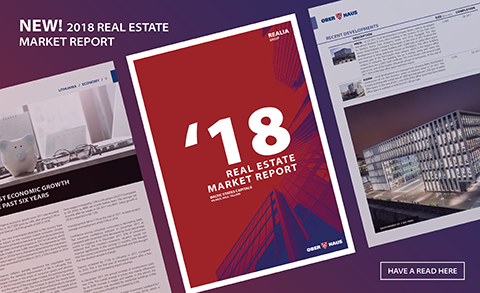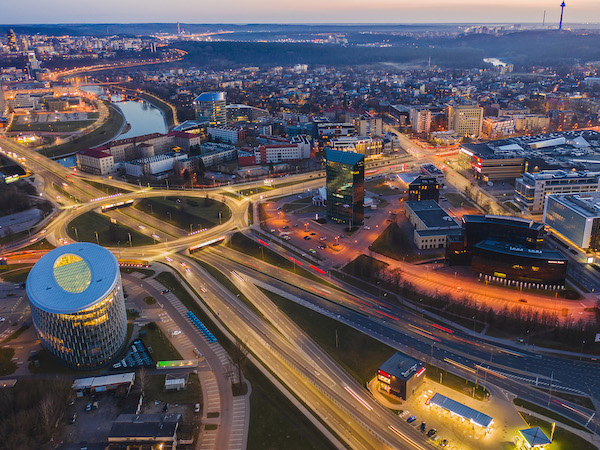The Baltic real estate market is moving in the same direction, but at different speeds
 The Baltic real estate market was resilient enough and managed to recover quickly after the recent global economic recession and has shown visible subsequent successful development. However, despite the overall similarity between the countries, Estonia, Latvia and Lithuania are at different stages of development both in terms of comparing all the countries and individual processes within each country. The capital cities of the Baltic countries remain the hot spots of the real estate map.
The Baltic real estate market was resilient enough and managed to recover quickly after the recent global economic recession and has shown visible subsequent successful development. However, despite the overall similarity between the countries, Estonia, Latvia and Lithuania are at different stages of development both in terms of comparing all the countries and individual processes within each country. The capital cities of the Baltic countries remain the hot spots of the real estate map.
‘If over the past five years impressive changes have been recorded in Tallinn and Vilnius, which are currently at new all-time highs, essential changes in Riga are still underway. Therefore, these cities can offer a wide range of liquidity risks to investors, developers and businesses. The markets of some capitals are becoming tight, which encourages market players to channel investments to other regions: suburbs of the capital cities, resort towns or other larger cities, e.g. to the second largest city in Lithuania – Kaunas’, Raimondas Reginis, Ober-Haus Research Manager for the Baltics, said.
The year 2017 was indeed successful for the Baltic countries, because further economic growth contributed to development of the real estate market. Despite various challenges faced by all the Baltic countries, the overall investment climate remains positive.
‘This is particularly important to foreign investors, who see those positive changes and this is translated into real actions. Foreign direct investment development agencies whose task is to increase awareness of the countries globally and to attract new investment play an increasingly important role in the real estate market. According to the information available to Ober-Haus, in 2017 foreign investment promotion agency Invest Lithuania achieved the best result in the history of its operations and attracted 39 foreign direct investment (FDI) projects; these new projects will lead to the creation of over 5,000 new jobs in Lithuania. And it is important to note that, in addition to Vilnius, a substantial part of this FDI will go to other regions of the country, which will give an impetus to various real estate sectors,’ Mr. Reginis said.
In the meantime, investment in commercial property which generates stable income has remained high on the agenda. In 2017, the highest activity rate in the Baltic real estate market was recorded in Lithuania, where investment volumes in core commercial property reached €312 million and outpaced the previous record in 2008 (€310 million). Activity in the investment transactions market determined a further decrease in yields, which in individual cases is lower than 6%. This attests to the overall confidence of investors in the markets of the Baltic countries and in particular in prime property. For those seeking higher yields, the Baltic real estate market can offer a wide range of different options to guarantee 8% or even higher yields to investors.
Expanding services sector companies have become the main players in the modern offices market and encourage a further quantitative and qualitative leap in this sector. In order to meet high demand, in recent years developers have significantly increased investment in the development of modern offices. According to Ober-Haus, in 2016–2018, a total of 450,000 sqm office space will be offered in the markets of the Baltic countries. Vilnius will have the largest share (46%) with Tallinn close behind (38%), while Riga will have the smallest increase in supply.
Despite the modest supply indicators in Riga, positive trends can be seen in this largest city of the Baltic countries – every year developers are more courageous and propose more and larger new projects to the market. ‘If the economic and social conditions remain favorable, Riga will have the greatest growth potential. However, developers invest not only in quantitative parameters, but also increase their focus on quality projects, which is becoming increasingly important for today’s clients,‘ Mr. Reginis added.
More and more money are spending on housing in Baltics
Ever better indicators are also recorded each year in the residential property sector. According to Ober-Haus, in 2017, buyers spent almost €3.7 billion on apartment purchases in the Baltic countries, 10% more than in 2016 (growth was recorded across all three countries). Estonia and Lithuania each account for 41% of this sum and Latvia accounts for the remaining portion (18%).
In terms of investment per capita, Estonia remains the obvious leader. ‘This is not surprising because Estonia and its capital Tallinn feature the highest average prices for residential property and largest activity in the housing market. Lithuania and its capital Vilnius are in second place and Latvia and its capital Riga are left furthest behind. The recent global crisis hit Latvia, whose capital city was previously labelled as the most expensive city of the Baltic countries, most severely,’ Mr. Reginis said.
Despite different activity trends in the housing market in the Baltic capitals in 2017, the total number of transactions remains high. According to the information available to Ober-Haus, after a record year in 2016, the number of apartment transactions in Vilnius in 2017 fell by 6%, in Riga fell by 1%. In the meantime, annual growth of 7% was recorded in Tallinn and this was a new high.
The trend of rising apartment prices remains in all Baltic capitals. In 2017, an annual increase in the price of apartments from 4% to 12% was recorded in the capital cities: apartment prices in Vilnius increased by almost 4%, in Riga – 6%, in Tallinn – 12%. ‘The main factors of housing activity and increase in prices remain the same – increasing income of the population, positive expectations of households, attractive mortgage conditions and confidence in the real estate market. The housing affordability indicators over the past three years show that the situation remains stable in all Baltic capitals, i.e. housing prices are essentially moving at the same rate and in the same direction as the income of the population,’ Mr. Reginis said.
Latest news
 All news
All news

A more favourable house price to wage ratio for buyers in 2023 and 2024
Ober-Haus Apartment Price Index for Lithuania (OHBI), which captures changes in apartment prices in the five largest Lithuanian cities (Vilnius, Kaunas, Klaipėda, Šiauliai and Panevėžys), increased by 0.2% in February 2024. The overall level of apartment prices in Lithuania's major cities has grown by 2.2% over the last 12 months (annual growth of 2.1% in January 2024). In February 2024, the sales prices of apartments in Vilnius, Kaunas and Klaipėda grew by 0.3%, 0.3% and 0.1%, respectively, and the average price per square metre amounted to EUR 2,589 (+8 Eur/m²), EUR 1,751 (+6 Eur/m²) and EUR 1,651 (+1 Eur/m²). Meanwhile, Šiauliai recorded a 0.2% decrease in apartment prices in February, with the average price per square metre amounting to EUR 1,095 (-3 Eur/m²). In Panevėžys, the average price per square metre remained unchanged at EUR 1,075 per square metre. Over the year (February 2024 compared to February 2023), apartment prices grew in all major cities of the country: in Vilnius - by 1.8%, in Kaunas - by 3.2%, in Klaipėda - by 3.0%, in Šiauliai - by 1.7%, and in Panevėžys - by 1.8%. "Although the cold snap that has gripped the country's housing market is not going away yet,…

The cumulative effect of several years of housing market activity decline, suggests around 40% lower construction volumes in 2024
Over the past few years in Lithuania, we have seen a rapid decline in housing market activity, which has impacted the volume of new housing developments. However, apartment building developers in the country’s major cities have been facing the toughest challenges lately, with very modest apartment sales figures in the period 2022–2023. According to Ober-Haus, compared to the record activity of 2021, in 2023, the sales of apartments in the primary market were down by 68% in Vilnius, 55% in Kaunas, and 57% in Klaipėda. “Despite the two- to three-fold decrease in the sales of newly-built apartments, a very high number of apartments were nevertheless completed in the country’s major cities in 2023, because the development of these projects had begun during 2021 and 2022,” said Raimondas Reginis, Head of Market Research for the Baltics at Ober-Haus. According to Ober-Haus, in 2023, developers in Vilnius built 4,915 apartments for sale – 18% more than in 2022. When considering the last two decades, this is one of the highest figures, second only to those in 2007, 2008 and 2020, when more than 5,000 apartments were built for sale. In 2023, 52 different apartment projects (including ongoing project phases) were available for…

Building permit for the construction of the housing project Vilniaus Džiazas has been obtained
Unique Properties, a real estate development company, has received a permit and started the construction of the Vilniaus Džiazas project in K. Vanagėlio Street in Vilnius Old Town. K. Vanagėlio str. 11 and 18, which consists of a two-storey apartment building with 62 apartments and 11 commercial premises, a 1200 sqm administrative cultural heritage object of interwar construction and public spaces. The project will feature apartments with 4,5 m high ceilings and 4 m high stained-glass windows, the ground floor will have private patios and access to a garden, while the second and third floors will have balconies and the last floor will have private terraces. According to Gediminas Tursa, CEO of Unique Properties, Vilniaus Džiazas aims to revitalise a part of the Old Town that was undeservedly forgotten during the Soviet era, and to reconnect it with the Rasa. The complex not only includes an open and lively commercial street along the north-south axis, but also new pedestrian and cycling connections to the railway station. "After obtaining the building permit, the company received a lot of interest from interested parties and within a couple of weeks it sold several more apartments - currently Vilniaus Džiazas has signed about 20…
 All news
All news


